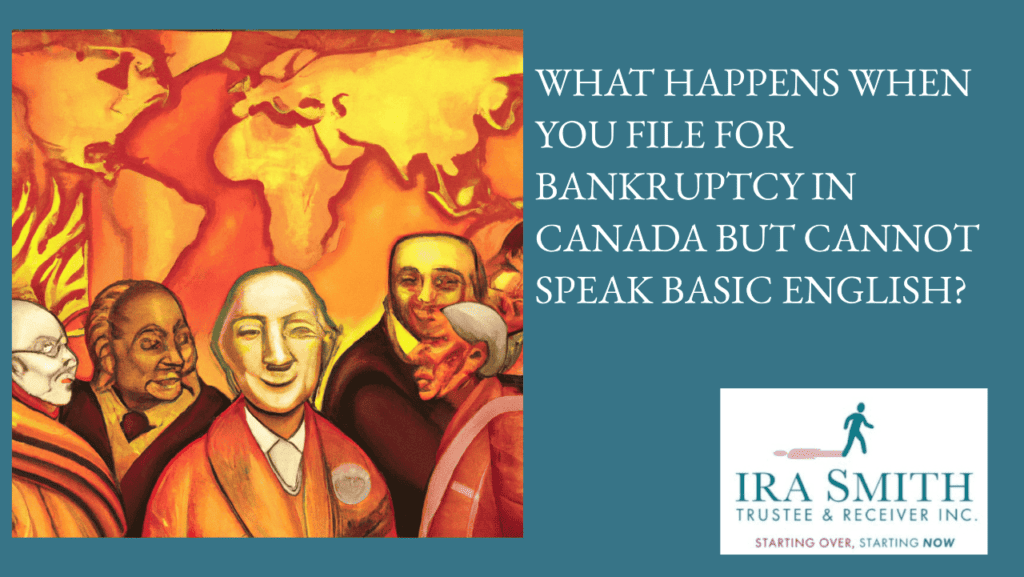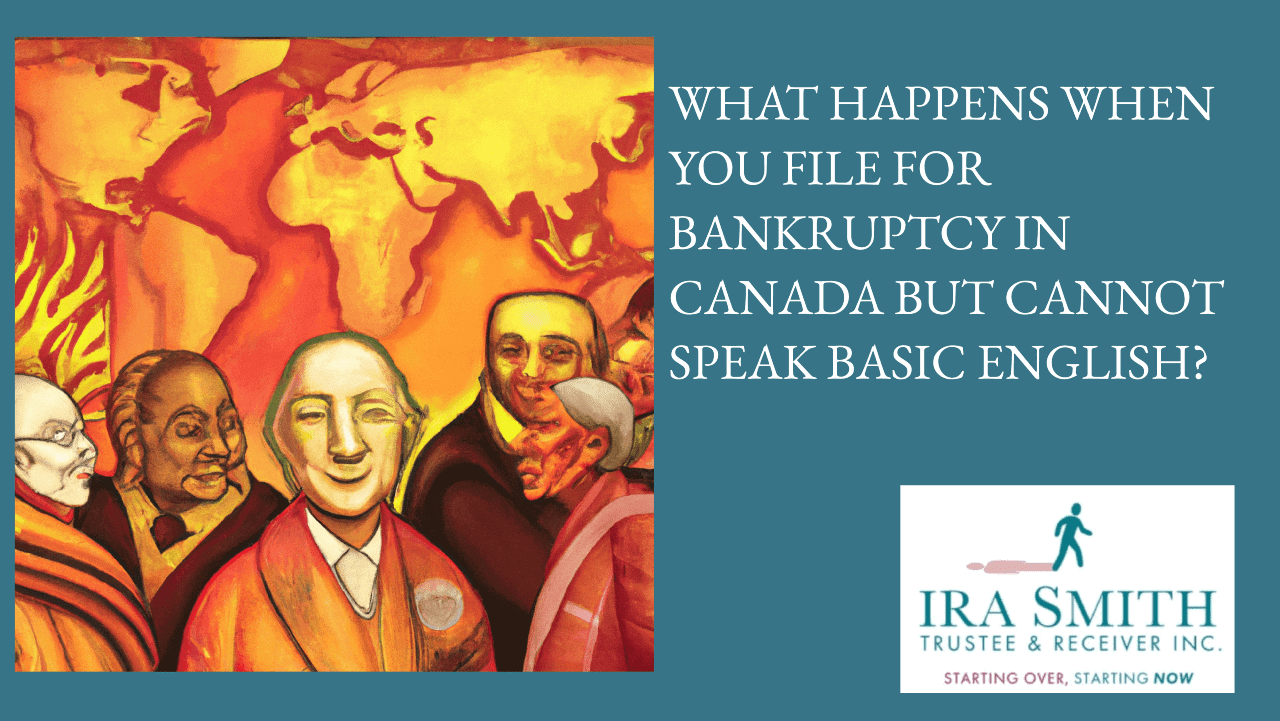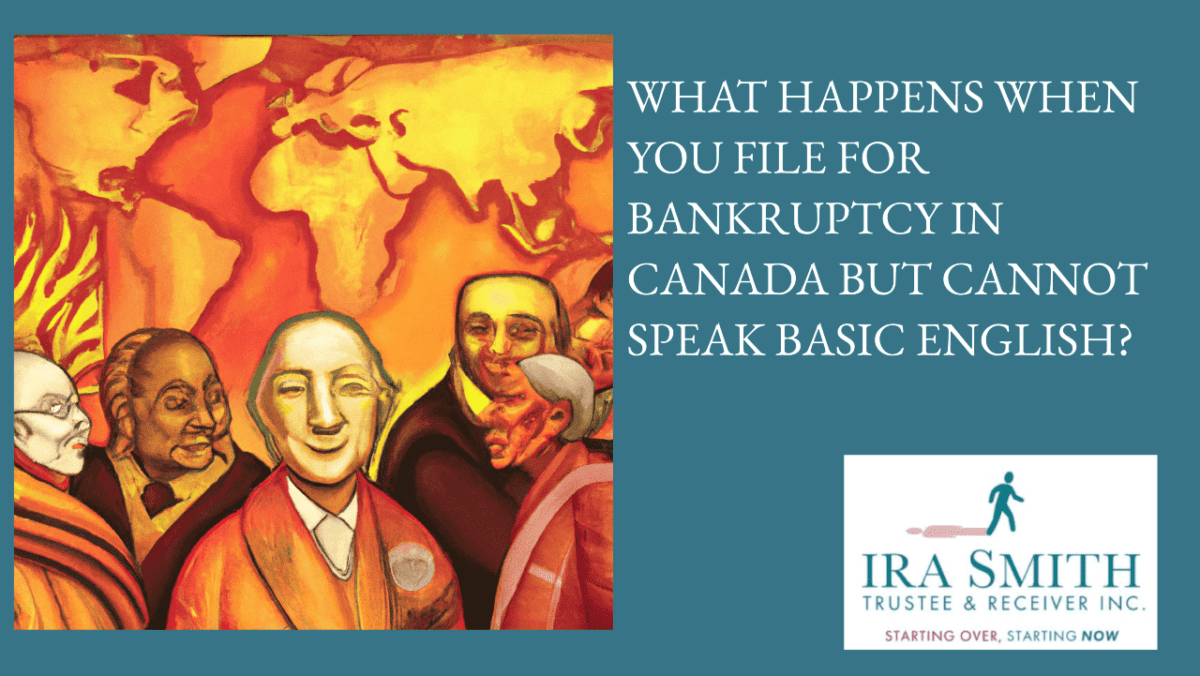Thank you for reading our Brandon's Blog. Check out our AI insolvency bot on this page and don't forget to subscribe!
- What happens when you file for bankruptcy? Introduction
- What happens when you file for bankruptcy? Importance of understanding the bankruptcy process in Canada
- What happens when you file for bankruptcy? Requirements and eligibility criteria for filing for bankruptcy in Canada
- What happens when you file for bankruptcy? Language barriers and their implications
- What happens when you file for bankruptcy? Access to language support services
- What happens when you file for bankruptcy? The Ali (Re) case
- What happens when you file for bankruptcy? The OSB position
- What happens when you file for bankruptcy? Conclusion
What happens when you file for bankruptcy? Introduction
Canada has two official languages: English and French. Canada’s cultural diversity means that our citizens speak a wide range of languages as their native tongue. In Ontario, the majority of the people’s mother tongue is English. That is the language throughout this Brandon’s Blog site, however, if French is your native tongue, you can conveniently substitute the two languages wherever I speak of English, one for the other.
What happens when you file for bankruptcy in Canada when English or French isn’t your native language? In this Brandon’s Blog site, I will certainly discover the unique obstacles faced by non-English speakers in this process and also overview you on exactly how to get rid of language barriers, access necessary sources, as well as seek emotional support throughout this hard time.
Declaring bankruptcy is already a tough as well as stressful trip, and it becomes a lot more intimidating for people that do not speak English. Navigating the Canadian insolvency system needs a comprehensive understanding of the process and paperwork, all as explained by the licensed insolvency trustee, making language effectiveness paramount. Unfortunately, the lack of English can prevent those people from completely understanding their situation.
This Brandon’s Blog about what happens when you file for bankruptcy but cannot speak English reviews a BC court case as well as the resulting policy statement from the Office of the Superintendent of Bankruptcy on this exact subject.
What happens when you file for bankruptcy? Importance of understanding the bankruptcy process in Canada
Trying to understand the Canadian insolvency regime and what happens when you file for bankruptcy is difficult for every layman and particularly for people facing language obstacles due to their limited English. Navigating the ins and outs of insolvency can prove to be an overwhelming job, and language obstacles can worsen the difficulties. Nevertheless, equipped with a thorough understanding of the process, those that talk languages other than English or French can properly tackle their financial dilemma, access necessary resources, and discover the essential emotional support.
What happens when you file for bankruptcy? Declaring bankruptcy is a legal process that grants individuals and even enterprises a fresh start when they can no longer fulfill their financial obligations. In Canada, the insolvency procedure is overseen by the Bankruptcy and Insolvency Act (BIA). This intricate course of action entails various stages and specific regulations for addressing a multitude of concerns. Grasping the ins and outs of the insolvency process is vital for any individual or business seeking to restructure or entirely absolve their debt because they cannot afford to make the debt payments they are obligated to make.
The journey through insolvency can be overwhelming, particularly for an individual who lacks proficiency in English, but there’s no need for it to be so. Armed with the right information and supported emotionally and linguistically, both individuals and companies can make well-informed decisions about their financial future.

What happens when you file for bankruptcy? Requirements and eligibility criteria for filing for bankruptcy in Canada
To launch an insolvency filing in Canada, it is necessary to satisfy certain requirements. It is critical to have a comprehensive understanding of these criteria, no matter your mother tongue.
Eligibility for a declaration under the BIA needs the person or company to be insolvent. The BIA uses three main criteria to identify the insolvency condition of a specific person or business:
- Does the person or company owe $1,000 or more?
- Are they incapable to satisfy their liabilities as they end up being due?
- If they were to sell off all their assets, would the cash not be able to fully pay off their liabilities?
If you are able to answer “yes” to the very first inquiry as well as “yes” to either or both of the 2nd and 3rd questions, you or your company meet the standards for insolvency under the BIA and are eligible to proceed with an insolvency declaration.
Language barriers can complicate this procedure, making it important to overcome them in order to access the Canadian insolvency system. Utilizing an interpreter is an effective strategy for resolving the language obstacle and efficiently accessing the Canadian insolvency system. By fixing the linguistic divide, individuals are able to completely be involved with the system, make informed choices, and obtain the necessary assistance throughout the insolvency process.
What happens when you file for bankruptcy? Language barriers and their implications
Challenges faced by individuals who cannot speak basic English
When people who are not skilled in English seek help from Canada’s insolvency system legal process, they come across a wide range of challenges, especially when involving their creditors and the licensed insolvency trustee. Language barriers can greatly impede their ability to properly describe their financial difficulties, understand what happens when they file for bankruptcy, understand the insolvency process, and properly complete the needed documents. This interaction space can trigger misconceptions, delays, and also legal issues that are beyond their control. As we look into the conversation below, it comes to be evident that getting expert support, such as working with interpreters or translators, is crucial for non-English speakers to assist in reliable communication throughout the insolvency process.
Types of insolvency process people and companies can access
In the consumer market, the available insolvency processes are:
- Consumer proposal to restructure debts and avoid bankruptcy.
- Division I proposal to restructure debts and avoid bankruptcy.
- Bankruptcy – summary administration or ordinary administration.
For the corporate market, the insolvency processes under the BIA are:
- Division I proposal to restructure debts and avoid bankruptcy.
- Receivership.
- Bankruptcy – ordinary administration.
If you use the search function in the top right corner of this Brandon’s Blog and type in any of the above terminologies, you will find previous Brandon’s Blogs covering all these insolvency topics.
As you will see from the discussion of the court decision and the OSB’s position paper, the licensed insolvency trustee is responsible for hiring a qualified interpreter for a person who cannot speak English in specific situations. The cost of the interpreter in a Division I proposal, receivership or ordinary bankruptcy is not an issue as the cost is an allowable expense. Where the issue comes into play to pay for the cost of interpreter services is in both a summary administration bankruptcy or a consumer proposal.

What happens when you file for bankruptcy? Access to language support services
The OSB, in response to the British Columbia Supreme Court’s ruling in Ali (Re) 2022 BCSC 169, has lately revealed its position paper that emphasizes the critical value of diversity and also language inclusivity in our society. This document presents comprehensive guidelines for interpreter services, aiming to level the playing field and make sure equal accessibility to these important services, all the while adhering to the BIA and relevant case law.
This July 24, 2023 position paper explores the pivotal functions taken on by Licensed Insolvency Trustees in working with interpreter solutions for debtors during OSB examinations or meetings of creditors. Additionally, it clarifies the step-by-step process whereby Trustees can look for repayment of interpreter expenses from the estate. By promoting practical and also fair access to interpreter services, we can foster an all-encompassing and also inclusive culture that celebrates as well as appreciates the uniqueness of every individual’s voice.
The OSB maintains that if a debtor is unable to communicate fluently in the official language used during an OSB examination or the meeting of creditors, the Trustee must engage the services of an approved interpreter. The OSB’s position paper states that the Trustee has the responsibility of arranging and paying for the services of the interpreter.
As stated above, this really is a non-issue in every insolvency administration other than for a summary administration consumer bankruptcy or a consumer proposal. This is where the Ali (Re) case comes in.
What happens when you file for bankruptcy? The Ali (Re) case
This case before a judge in the BC Supreme Court was a result of an appeal from a decision of a Registrar sitting in bankruptcy court. The issue is who is responsible for paying the cost of an interpreter in a summary administration bankruptcy estate. In a summary administration bankruptcy, the Trustee’s fee is calculated by a government-set tariff and the Trustee’s disbursements, as part of the tariff, are fixed as an allowance of $100. As an aside, in a consumer proposal, the Trustee’s fee is a tariff calculation also and other than for the filing fee and court fee, there is no allowance for disbursements.
In this summary administration consumer bankruptcy estate, the Registrar determined that the Trustee was not responsible for paying for the cost of the service of an interpreter for an examination of the bankrupt as required by the OSB The Registrar, however, did not specify whether the bankrupt or the OSB was required to pay this expense.
In this case, The bankrupt is originally from Lebanon and her first language is Arabic. She came to Canada as a refugee in 2000. She is functional in English but did not feel comfortable with technical or business English, so she requested an interpreter. The Trustee found several individuals who spoke Arabic and were willing to translate for the bankrupt during the examination. However, they were not certified interpreters. The OSB insisted that at its examination, only certified interpreters were acceptable. The cost of retaining a certified interpreter for this duration ranges from $190 to $305.
The Trustee applied to the court to determine who is the responsible party for paying for a certified interpreter. The Registrar concluded that the Trustee was not responsible for the cost of the interpreter, as the Trustee had fulfilled their duty of arranging for the services of an OSB-approved translator. However, the issue of expense responsibility remained unresolved. As a result, both the Trustee and the OSB appealed the Registrar’s decision to a judge in the BC Supreme Court.
The OSB wants the Registrar’s order set aside. It seeks declarations that the Trustee is required to pay the cost of an approved interpreter and will be compensated out of the general remuneration from the bankrupt’s estate provided by the tariff.
The Trustee submits that the Registrar erred in failing to find that the government levy it receives pursuant to s. 147 of the BIA whenever a Trustee distributes funds and was set up to pay for the cost of the government administering the Canadian bankruptcy system is to be used to pay for the expense of having a certified interpreter attend the bankrupt’s examination by the OSB.
Our national association, the Canadian Association of Insolvency and Restructuring Professionals (CAIRP), sought and obtained intervenor status. CAIRP’s position was that the Trustee of the bankruptcy estate usually paid the cost, with correspondingly lower distribution to creditors. It recognizes that, on rare occasions, the Trustee will have to pay this expense where an estate has no assets. However, it submits that a general “trustee pays” rule skews incentives and access to the bankruptcy system by vulnerable groups.
The judge reviewed the BIA legislation and available case law and determined that the Registrar’s order should be set aside. The judge further ruled that the Trustee is entitled to the expenses it incurs, from the bankrupt’s estate, for the services of an interpreter for an examination requested by and to be conducted by the OSB.

What happens when you file for bankruptcy? The OSB position
Abiding by the court’s decision, the OSB now recognizes that the cost of interpreter services used for an examination conducted by the OSB or for a meeting of creditors is a reimbursable expense in a summary administration consumer bankruptcy (or in a consumer proposal). However, rather than just saying that the OSB will now approve it in those circumstances, it forces Trustees to go for taxation just like in ordinary administrations. In an ordinary administration, the Trustee is entitled to recover its time and disbursements in going for taxation or as the court may otherwise determine.
I can only imagine that if a Trustee goes for taxation in a summary administration or consumer proposal because of interpreter services costs, the OSB very well may take the position that the fee and disbursements of the Trustee in going for taxation are non-recoverable. What leads me to that conclusion is that in the position paper, the OSB states that the Trustee may just decide to:
“Consider the expenses incurred for the services of an interpreter as encompassed under their fees chargeable under section 128 of the Rules, not claim to recover the specific expenses, send their final statement of receipts and disbursements, and proceed to deemed taxation and discharge under sections 62 and 65 of the Rules.”
In other words, what happens when you file for bankruptcy and require an interpreter for those special situations, don’t bother trying to claim the cost of the interpreter, file your summary administration final statement of receipts and disbursements without including that cost, and you won’t have to get your fee and disbursements taxed as it will be in accordance with the tariff. If the Trustee decides to go for taxation to claim the interpreter cost, and perhaps the cost of going for taxation, then it is open for the OSB to issue a negative comment letter and oppose the taxation in court.
What happens when you file for bankruptcy? Conclusion
What happens when you file for bankruptcy is a challenge for all debtors, particularly for those who do not speak English or French. Language barriers can complicate the already difficult financial situation faced by non-English speakers.
However, it is crucial to recognize that language should not hinder individuals from seeking help and relief. Various resources are available to assist non-English speakers in navigating the bankruptcy process and overcoming language barriers. As seen from the above case and the OSB position paper, the Trustee must engage an approved interpreter for all OSB examinations or for a meeting of creditors.
I hope you enjoyed this what happens when you file for bankruptcy Brandon’s Blog. Problems with making ends meet are a growing concern in Canada, affecting individuals of all ages and income levels.
Creating a solid financial plan can be the key to unlocking a brighter and more prosperous future. By taking control of your finances, you can prioritize your expenses, set clear financial goals, and build a strong foundation for your dreams to come true. With the right mindset and approach, financial planning can empower you to regain control, eliminate this issue as a source of stress in your life and find peace of mind.
Individuals must take proactive measures to address financial difficulties and promptly seek assistance when necessary. It is crucial to recognize that financial stress is a prevalent concern and seeking help is a demonstration of fortitude, rather than vulnerability. Should you encounter challenges in managing your finances and find yourself burdened by stress, do not delay in pursuing aid.
Revenue and cash flow shortages are critical issues facing people, entrepreneurs and their companies and businesses that are in financial distress. Are you now worried about just how you or your business are going to survive? Are you worried about what your fiduciary obligations are and not sure if the decisions you are about to make are the correct ones to avoid personal liability? Those concerns are obviously on your mind.
The Ira Smith Team understands these concerns. More significantly, we know the requirements of the business owner or the individual that has way too much financial debt. You are trying to manage these difficult financial problems and you are understandably anxious.
It is not your fault you can’t fix this problem on your own and it does not mean that you are a bad person. The pandemic has thrown everyone a curveball. We have not been trained to deal with this. You have only been taught the old ways. The old ways do not work anymore. The Ira Smith Team uses innovative and cutting-edge methodologies, to adeptly navigate you through the intricacies of your financial challenges, ensuring a resolution to your debt-related predicaments without resorting to the rigours of the bankruptcy process. We can get you debt relief now!
We have helped many entrepreneurs and their insolvent companies who thought that consulting with a Trustee and receiver meant their company would go bankrupt. On the contrary. We helped turn their companies around through financial restructuring.
We look at your whole circumstance and design a strategy that is as distinct as you are. We take the load off of your shoulders as part of the debt settlement strategy we will draft just for you.
The Ira Smith Trustee & Receiver Inc. team understands that people facing money problems require a lifeline. That is why we can establish a restructuring procedure for you and end the discomfort you feel.
Call us now for a no-cost consultation. We will listen to the unique issues facing you and provide you with practical and actionable ideas you can implement right away to end the pain points in your life, Starting Over, Starting Now.


